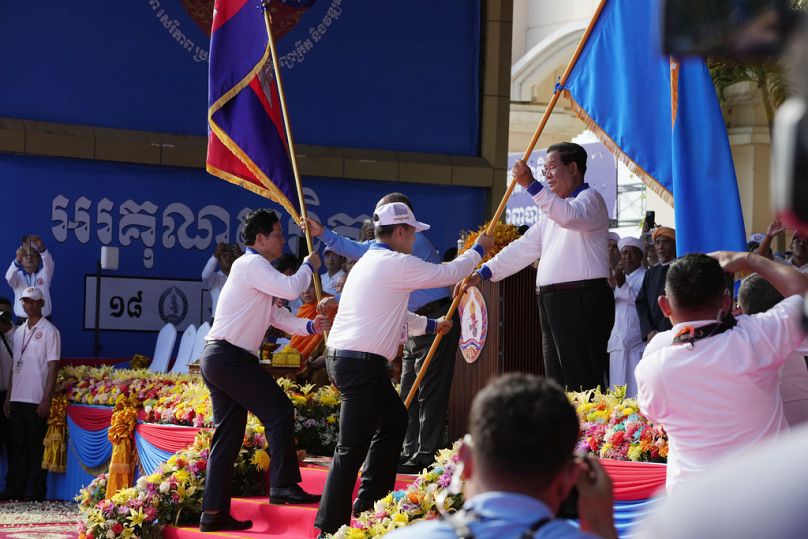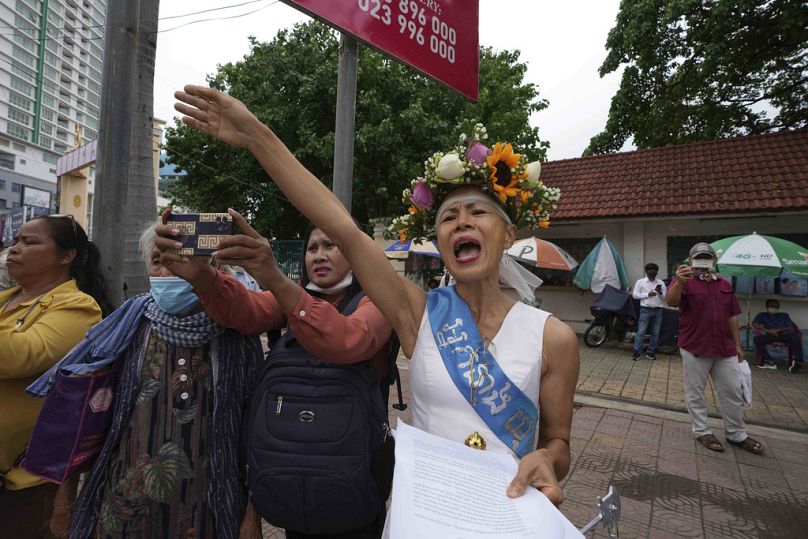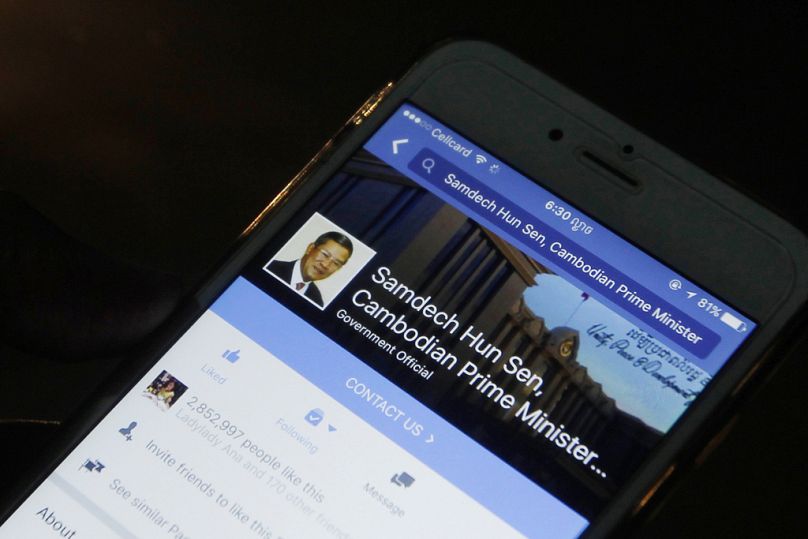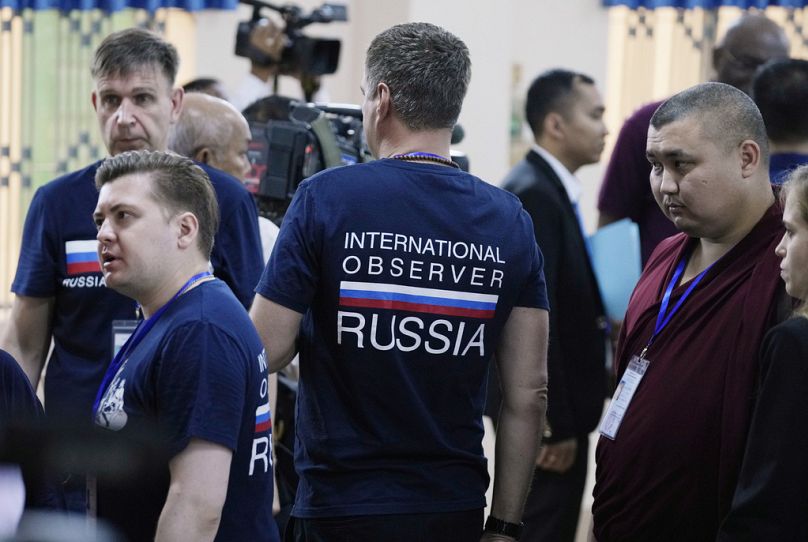If the West were to recognise recent election results enabling a dynastic one-party state, it would mean encouraging dictators worldwide and failing the Cambodian people and the international legal order, Sam Rainsy writes.
On Sunday, the world witnessed yet another wholly fraudulent election in Cambodia.
 ADVERTISEMENT
ADVERTISEMENT
 ADVERTISEMENT
ADVERTISEMENT
This Soviet-style pseudo-act of democracy, in a country that has been ruled by one man since 1985, was about paving the way for a dynastic transition between Hun Sen and his son, Hun Manet.
The current leader of the country’s army, and a graduate of West Point, NYU, and Bristol University, many hope that Cambodian democracy may be reborn with Manet coming to power – but, make no mistake, just like with Syria’s Bashar al-Assad and North Korea’s Kim Jong Un, this will not be the case.
Hun Manet will continue the rule of this father, who, for almost four decades, has built a highly centralised power structure, which prioritises self-aggrandisement, and that has little respect for democracy or human rights.
Under Hun Sen’s watch, extrajudicial killings, torture, arbitrary arrests, summary trials, censorship, bans on assembly and association, and a national network of spies and informers have become commonplace.
This is the backdrop to Cambodia’s fledgling democracy and an environment that the international community is seemingly incapable of responding resolutely.
The formal transition between Hun Sen and Hun Manet was announced on Wednesday and is set to happen by the end of the summer, in time for the son to address the UN General Assembly in September.
For the international community to recognise this undemocratic handover of power on the back of a sham election in which the main opposition party was formally banned from fielding candidates means to condone the regime’s systemic human rights abuses and totalitarianism.
Cambodia is no longer a pluralist nation as defined in its constitution — it is merely a one-party state.
Hun Sen's threats are not just threats
Over a quarter of candidates in this year’s elections are related to members of Hun Sen’s government. Political opposition has been stifled in the country.
I, myself, have spent the past seven years in exile. In my absence, Hun Sen’s administration sentenced me to life in prison, and on 31 May, publicly threatened to kill me with missiles if I return to my country.
I am only one of hundreds that he has threatened in this way — and these are not mere threats.
Candlelight, the only credible opposition party, was banned from the elections in May on a bureaucratic technicality.
This year, its members have reported being attacked in the street by masked men.
Political dissidents of all kinds have been targeted, including the president of the labour union Chea Vichea, who was killed in 2004; environmentalists like the members of the NGO Mother Nature, arrested and imprisoned in 2020; as well as independent political analysts like Kem Ley, who was shot dead in 2016.
Kem Sohka, leader of our party, the banned Cambodia National Rescue Party, was sentenced to 27 years in prison on spurious charges.
There has also been a systematic assault on the country’s free press, with popular newspapers, including Cambodia Daily and The Phnom Penh Post, either closed or subject to hostile takeovers by those allied with Hun Sen.
In the case of the latter, the outlet was sold out of state to a Malaysian investor linked with the prime minister and, in turn, has subsequently shifted its editorial line to support government activity.
The case of Hun Sen vs Facebook
Hun Sen’s campaign to obstruct the freedom of expression for Cambodians extends to social media.
Last month, he deleted his Facebook account following a ruling by Meta’s Oversight Board that he should face a six-month ban from the platform over a video post in which he yet again threatened to have opponents beaten.
The following day, the Cambodian Ministry of Post and Telecommunications announced they would deport a Meta representative immediately, and Cambodia would cease all cooperation with the company.
In a subsequent statement, all members of its Oversight Board were banned from entering the country.
Meanwhile, in the past few weeks, Hun Sen threatened to block Facebook entirely for the election period, thus depriving citizens of access to a forum that is free of government censorship.
This, ultimately, did not happen, but Hun Sen was explicit in his desired aims: to prevent contact between exiled opposition leaders and citizens of the country.
To achieve this, China-style National Internet Gateway was introduced, offering blanket regime control over any online activity.
Voided ballots led to immense fines and arbitrary arrests
Ahead of fraudulent elections, we led a campaign for Cambodians to void their ballot papers, en masse, in protest at Hun Sen’s regime and the absence of an alternative political opposition.
And this was something that Hun Sen feared. To mitigate against the impacts of such a move, he made spoiling a ballot a fineable offence of 20 million riels (€4,500) and charged me and others who advocated this hitherto lawful behaviour with attempting to undermine the election process.
He also ensured that polling booths were staffed only by members of his ruling Cambodian People’s Party (CPP), thus adding a further layer of intimidation.
And this was all after a widespread series of arbitrary arrests, focusing on local Candlelight leaders, including youth and women’s wings, and the forced defection of political prisoners — with some being offered government roles in exchange for their release, or even access to medical care previously denied to them.
The EU and the West should not fail the Cambodian people
The international community must back the democrats of Cambodia. They signed the Paris Accords as an obligation, when the first free and fair elections were held in June 1993, to guarantee that the Cambodian vote was free and peaceful.
They’re reneging on that promise. Hun Sen should be an international pariah, yet he chaired ASEAN for the third time in 2022.
In this capacity, under false hope for the restoration of democracy, he was invited to co-chair a summit with the EU in the US, further lending his regime the legitimacy of the West.
The UK just signed a billion-dollar trade agreement with Cambodia, while the EU’s partial withdrawal of tariff-free benefits for Cambodian goods entering the EU-27, on human rights and labour rights grounds, affects just 20% of exports.
Given the blatant breach of international obligations, the restriction of these special privileges ought to be significantly increased, and new sanctions from other countries should include asset freezes imposed on high-ranking officials involved in human rights violations.
We fear that, despite talk of monitoring Hun Sen’s disregard for human rights, many democratic leaders, particularly in the West, will ultimately recognise these fraudulent elections and give Sen the international legitimacy he needs to complete the dynastic transition to his son.
Doing so would come at a high cost, as it will mean encouraging dictators worldwide and failing the Cambodian people and the international legal order. This cannot happen.
Sam Rainsy is the interim leader of the Cambodian National Party, the main opposition party that was banned from standing in the 2018 Cambodian General Election. He lives in exile in Paris.
At Euronews, we believe all views matter. Contact us at view@euronews.com to send pitches or submissions and be part of the conversation.















